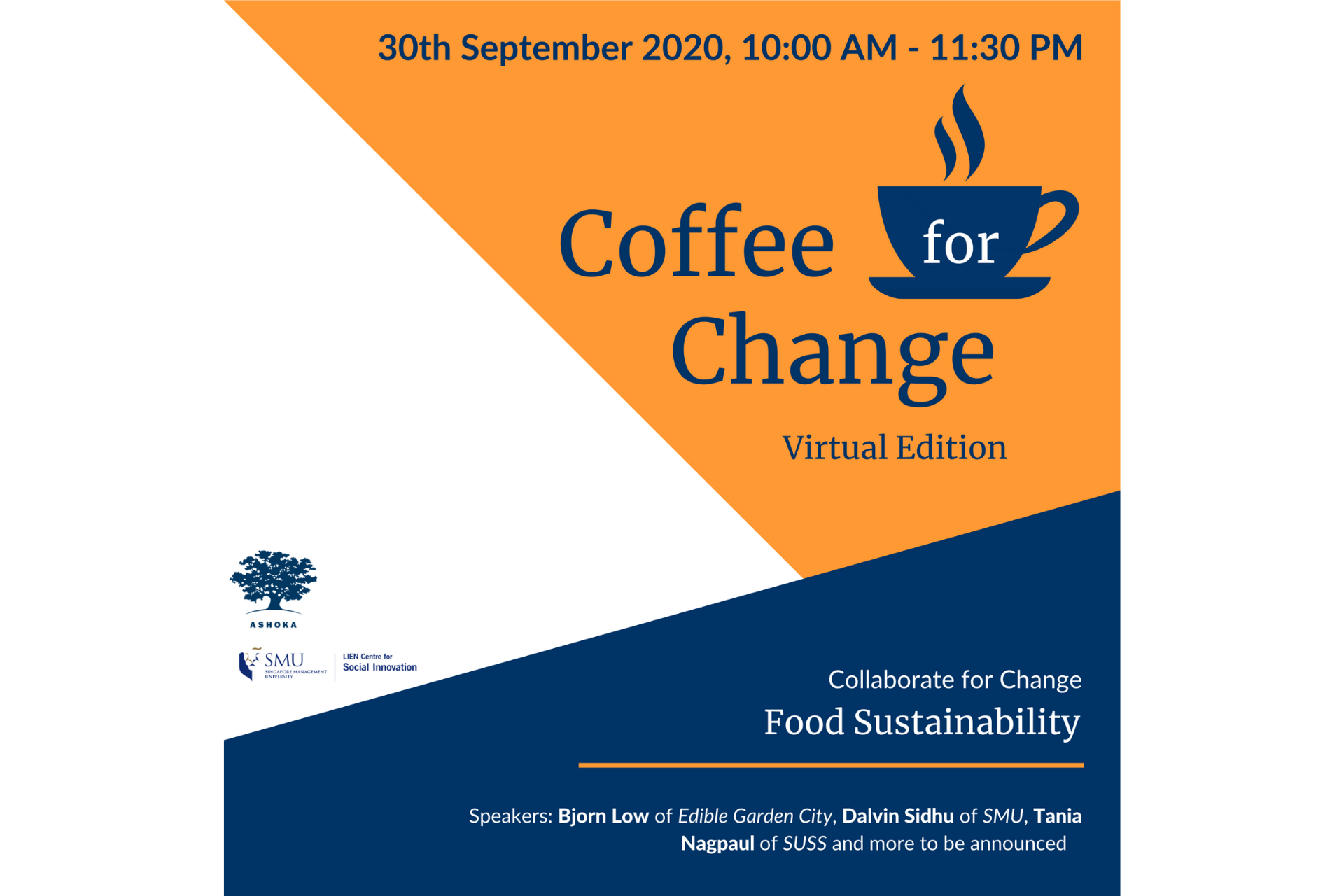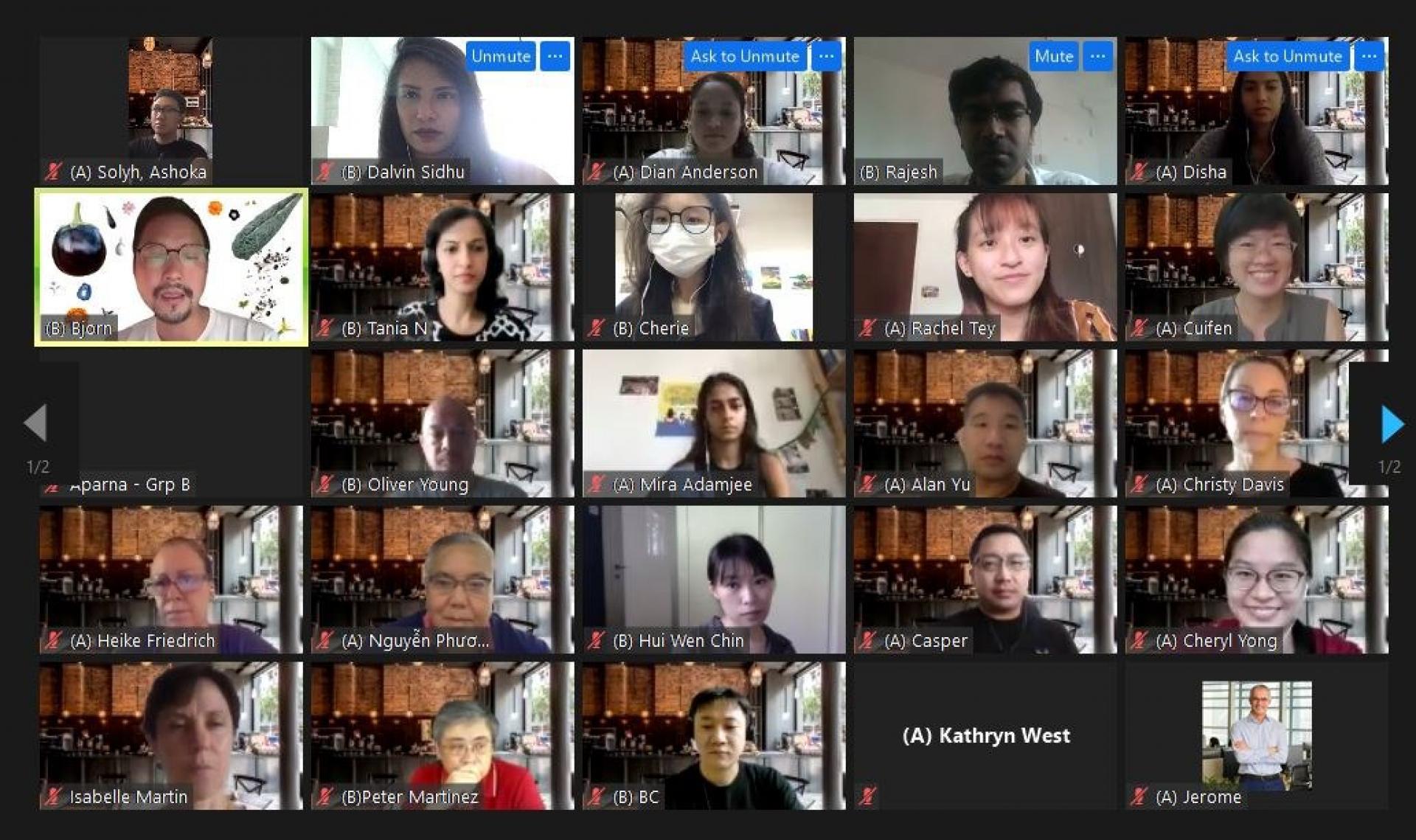Coffee For Change Dialogue: Food Insecurity in Singapore
Monday Oct 26,2020 | From Our Office

In a developed nation like Singapore, the term, “food insecurity” may seem foreign to many. However, the truth is that food insecurity is a real problem that exists in our backyard. In 2020, SMU's Lien Centre for Social Innovation published The Hunger Report, a study commissioned by Food Bank Singapore. It revealed that 10.4 per cent of Singaporean households experience food insecurity at least once a year.
So, what is food insecurity? Put simply, it refers to not having access to safe, sufficient and nutritious food to meet the basic dietary needs for a healthy life. In other words, having access to food does not mean that one is food-secure.
On 30 September, Ashoka Singapore convened a Coffee for Change virtual session on food sustainability in Singapore. Panellists included the co-authors of The Hunger Report, Dr Dalvin Sidhu and Dr Tania Nagpaul, as well as Bjorn Low, Ashoka fellow and founder of Edible Garden City; Cuifen Pui, director of Food Citizen; and Rachel Tey from the Eco-Youth Collective. The hour-long session delved into the various ways people reduce food waste and lead more sustainable lifestyles.

According to The Hunger Report, out of the 10.4 per cent of households that face food insecurity at least once annually, 3.5 per cent are classified as severely food-insecure, while 6.9 per cent are moderately secure. During the virtual dialogue, Dr Sidhu explained that the top five reasons for food insecurity relate to issues around financial constraints. “Many people cite monthly rental payments, job loss, or the inability to work because of an illness or childcare, among other money-related reasons as the most common reasons.”
However, identifying the problems is only one step towards finding a solution to curbing food insecurity in the country. Even though there are more than 200 organisations located across this city-state, Dr Nagpaul stated that many individuals who are food-insecure tend to be reticent in asking for help. “They tend to feel embarrassed, and some even feel excluded when they have to admit to not having access to healthy, nutritious food to serve themselves or their families.”
She added that the issue of food insecurity can be a complex one since it revolves around an individual or family’s capacity to buy food that they consider healthy, while also suiting their palates. “Food has to be something that people want to eat, because it doesn’t just feed the body, but also feeds our soul,” Dr Nagpaul said. When a family struggles to meet this basic need for nutritious food, then they are labelled as food-insecure.

Since food insecurity does not mean food unavailability, many people who need assistance tend not to come forward because they often believe that others may need the help more than they do. But the bigger problem is the stigma that lies around seeking food support.
Dr Nagpaul elaborated, “There is some level of disenchantment on the part of food-insecure individuals with the food support system, because many of them feel like they are being judged. For example, some recipients have shared that even the volunteers giving them handouts would tell them not to expect further monetary help, which can make them feel uncomfortable." Following such feedback, she stressed that a lot more can and needs to be done to destigmatise this environment.
Cuifen Pui brought up another related issue: food waste. She stated that even though many organisations are seeking better ways to address food insecurity, we still see quality food being discarded at restaurants and households. “In Singapore, the narrative that we don’t have to worry about food supply is very strong. There is also a mindset that farmers are so far away, and food produce goes through a long food supply chain before arriving at our supermarkets. As such, many people don't think much about food sustainability or when they throw away leftovers after every meal.”

As a sustainability advocate, Pui shared one way to heighten awareness around the value of food and community—by having a community garden. She said that when she started Food Citizen, a wider network of people began to connect from all over Singapore. “People were surprised that there were others who cared about sustainability the way they did. Today, people meet up to exchange the food they grow.” More than addressing the idea of food sustainability, Pui emphasised that having a community of like-minded people to encourage one another is also beneficial to our overall mental and emotional health.
After the hour-long discussion, the message was loud and clear: we all need to hold ourselves accountable for the choices we make and recognise that we have a role to play in fostering a more inclusive and sustainable future. The issue of food insecurity and food waste is not the responsibility of one individual or organisation; neither can it be tackled alone. But with the right approach, we can work towards becoming a healthier nation.
Images via Unsplash.